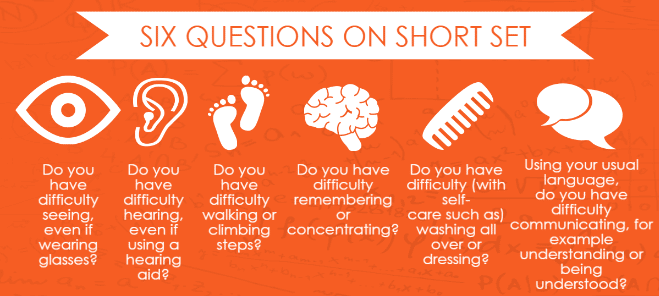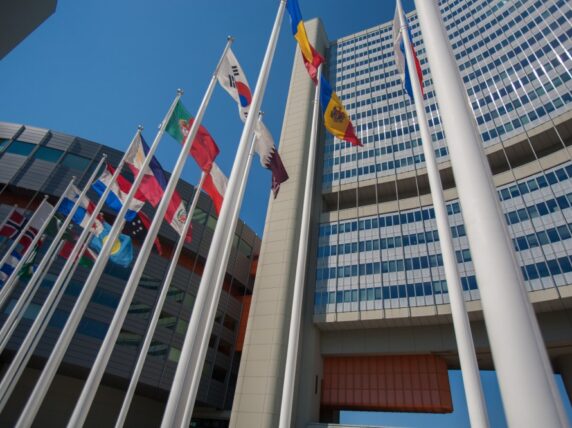Registering refugees with disabilities in refugee settings in Jordan
Because humanitarian actors lack information and knowledge about available or appropriate tools to collect data on persons with disabilities, they do not know how many refugees with disabilities are in refugee camps and urban areas.
Without knowing the number of refugees with disabilities, humanitarian actors are not equipped to identify their needs and implement inclusive projects. But this is about to change.
A changing international environment
The need to build a common framework to better identify persons with disabilities has been highlighted through the adoption of the Sustainable Development Goals and the Charter on inclusion of persons with disabilities in humanitarian action. In addition, the New York Declaration commits to address the special needs of all people in vulnerable situations who are travelling within large movements of refugees and migrants, including persons with disabilities. International partners and UN agencies are also increasingly searching for ways to ensure a rights-based approach to the needs of refugees and migrants with disabilities.
Making the most of this momentum, Handicap International (HI) presented its Disability Statistics in Humanitarian Action project at two major events last week: the Conference of States Parties to the UN Convention on the Rights of People with Disabilities in New York and the UNHCR-NGOs Annual Consultation in Geneva.
HI’s project on disability statistics – working with refugees in Jordan
A precondition for the establishment of registration data on refugees with disabilities is the existence of comparable and reliable data. However, existing data is often not comparable as it is collected in different ways – often using binary yes/no questions, such as “do you have a disability or medical condition”, which lead to underreporting. To implement inclusive responses during reception of refugees, it is essential to agree on the definition, tool and methodology to identify refugees with disabilities. In this project, HI is piloting with key humanitarian stakeholders the use of the Washington Group Short Set (WGSS) of questions in refugee settings.
Subscribe to our newsletter
Our weekly email newsletter, Network News, is an indispensable weekly digest of the latest updates on funding, jobs, resources, news and learning opportunities in the international development sector.
Get Network News
The Washington Group on Disability Statistics was established in 2001 under the UN Statistical Commission. Its goal is to develop and test tools to collect internationally comparable disability statistics, and to help actors better identify persons with disabilities.
Relevance of the WG to identify refugees with disabilities in Jordan
The Vulnerability Assessment Framework paper drafted by HI and UNHCR calls on humanitarian agencies providing direct services to refugees in Jordan to use the WGSS as a tool for screening and flagging disabilities.
The WGSS is a quick and efficient way to identify refugees with disabilities that can be introduced in existing data collection tools. It can easily be used by registration staff with no medical knowledge and understood by refugees as it focuses on basic actions. This tool also provides organisations with comparable data across different settings and allows them to identify trends and inform project implementation.
It is still early days in our pilot in Jordan but we have already learnt some valuable lessons:
- Training registration staff on disability is a pre-condition to using the WGSS. The questions challenge the way registration staff usually talk about disability (psychosocial, intellectual, visual, hearing, physical impairments). Training is the opportunity to move away from the medical understanding of disability and introduce the rights-based model on which the WGSS is based.
- It is not enough to just adapt data collections tools to include the WGSS. It is essential to understand how the data is collected, analysed and used. In Jordan we found that interview questionnaires could be adapted easily; however, changing the special needs code of the ProGres database – which is used by UNHCR worldwide – is much more complicated and will take time.
- Data on refugees with disabilities will highlight where access and participation issues are and can easily be used by actors to adjust service delivery and improve inclusion of refugees with disabilities.
Next steps
To ensure refugees with disabilities are not left behind, we recommend that the Global Compact takes into consideration disaggregating data by at least age, sex and disability – using the WG SS. This will ensure that persons with disabilities are identified in a timely way and will lead to more adequate planning and monitoring of services and support.
To support this effort, HI is developing training materials and guidelines on the use of the WG questions in humanitarian action. We will also continue to support UNHCR and other humanitarian stakeholders to ensure that refugees with disabilities are identified during registration efforts as a first step for the full recognition of their rights.
Category
News & viewsThemes
Disability and Inclusion



